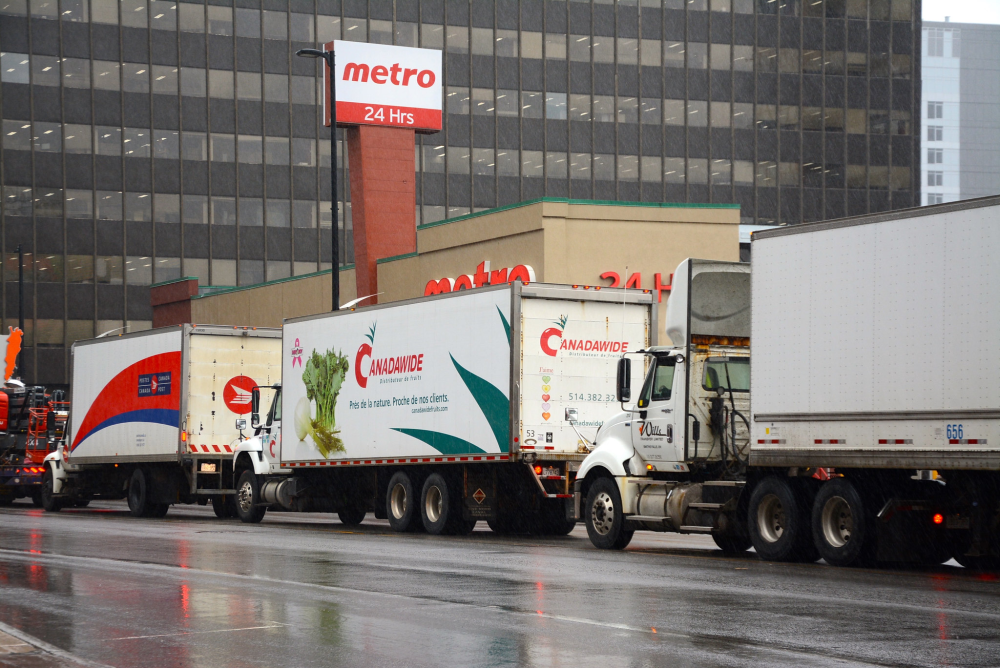TORONTO — To drive down greenhouse gas emissions and eliminate costly inefficiencies, an increased focus on urban freight and collaboration across municipalities and industry is critical, according to a new report from the Pembina Institute.
The Next Frontier for Climate Action: Decarbonizing urban freight in Canada finds that with projected population and employment growth in major Canadian cities, paired with a growing e-commerce sector and demand for fast and convenient deliveries of online purchases, cities need to better manage goods movement to combat traffic congestion, air, noise and carbon pollution, while saving time and money for businesses.
The report profiles freight emissions reductions actions from businesses and municipalities including Metro Vancouver, Calgary, Edmonton, the Greater Toronto and Hamilton Area, Ottawa, Montreal, and Halifax, and found that while strong action is already being taken in some areas, there are ample opportunities to share learnings to help cities move forward together. A shared and systematic approach to improved urban freight systems benefits businesses at a local level and is particularly important for those that operate in multiple provinces or on a national scale and require national solutions for maximum efficiency and cost-effectiveness.
The report outlines the benefits of improved freight management, the current challenges, and possible solutions of alternative delivery models, modes, and technologies, including delivery microhubs, cargo cycles, electric vehicles, and off-peak deliveries.
Quotes
“Businesses and Canadian municipalities are planning and exploring innovative ways to tackle growing populations and freight traffic. By creating space to share best practices, cities benefit by moving forward together, and businesses benefit with a more consistent regulatory approach. We know from our work that businesses, and all levels of government are eager to reduce emissions from freight, while easing traffic congestion and making cities work better for everyone. This is an exciting time for urban freight planning.”
— Carolyn Kim, Ontario regional director, Pembina Institute
“Urban freight isn’t just a municipal problem. Our recommendations show that all levels of government have a role to play — from cities driving innovative solutions, to consistent provincial regulatory frameworks, to funding from the federal government for low-carbon infrastructure and policies that make freight transportation cleaner. Governments, businesses and consumers have a vested interest in ensuring cities can move goods quickly, efficiently and cleanly, to contribute to Canada’s economy.”
— Josha MacNab, national strategy director, Pembina Institute
Quick facts
-
Transportation contributes 24 per cent of Canada’s carbon emissions, and freight trucks contribute 36 per cent of those emissions.
-
Transportation contributes a notable share of carbon emissions in major Canadian cities, the highest being 45 per cent in Metro Vancouver, to 31 per cent in the City of Edmonton.
-
Between 2016 and 2018, the average number of online purchases made by Canadians went up by 58 per cent.
-
Businesses spend approximately 28 per cent of their total logistics costs on conducting last-mile deliveries due to increasing traffic congestion, a lack of loading zones, and other inefficiencies.
-
The Pembina Institute is hosting Cities Taking Freight Action, a Canadian urban freight forum, in Toronto on March 3. The forum will gather together industry, policy makers, and freight thought leaders from across the country to create a space for knowledge sharing to help practitioners plan for freight in our communities.
[30]
Visit the Pembina Institute’s website to download a copy of The Next Frontier for Climate Action: Decarbonizing urban freight in Canada.
Contact
Kelly O’Connor
Associate communications director
416-220-8804
Background
Urban Delivery Solutions Initiative: A national network of businesses and organizations working to modernize urban freight operations in Canadian cities. The founding partners are Canada Post, Fresh City Farms, Purolator, and UPS.
Report: Delivering Last Mile Solutions: A feasibility analysis of microhubs and cyclelogistics in the GTHA
Report: The State of Freight




